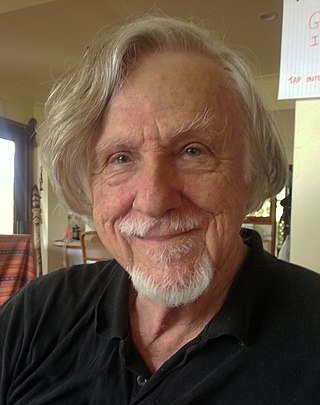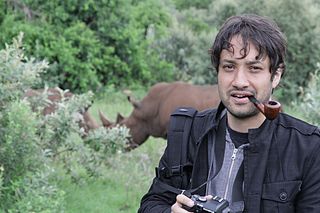Related Research Articles
Roman Kroitor was a Canadian filmmaker who was known as a pioneer of Cinéma vérité, as the co-founder of IMAX, and as the creator of the Sandde hand-drawn stereoscopic 3D animation system. He was also the original inspiration for The Force. His prodigious output garnered numerous awards, including two BAFTA Awards, three Cannes Film Festival awards, and two Oscar nominations.
The Hot Docs Canadian International Documentary Festival is the largest documentary festival in North America. The event takes place annually in Toronto, Ontario, Canada. The 27th edition of the festival took place online throughout May and June 2020. In addition to the annual festival, Hot Docs owns and operates the Hot Docs Ted Rogers Cinema, administers multiple production funds, and runs year-round screening programs including Doc Soup and Hot Docs Showcase.

Michael Dattilo Rubbo is an Australian documentarian/filmmaker.
Don Owen was a Canadian film director, writer and producer who spent most of his career with the National Film Board of Canada (NFB). His films Nobody Waved Good-bye and The Ernie Game are regarded as two of the most significant English Canadian films of the 1960s.
Hubert Davis is a Canadian filmmaker who was nominated for an Academy Award for Documentary Short Subject and an Emmy Award for Outstanding Cultural and Artistic Programming for his directorial debut in Hardwood, a short documentary exploring the life of his father, former Harlem Globetrotter Mel Davis. Davis was the first Afro-Canadian to be nominated for an Oscar.

Peter Raymont is a Canadian filmmaker and producer and the president of White Pine Pictures, an independent film, television and new media production company based in Toronto. Among his films are Shake Hands with the Devil: The Journey of Romeo Dallaire (2005), A Promise to the Dead: The Exile Journey of Ariel Dorfman (2007), The World Stopped Watching (2003) and The World Is Watching (1988). The 2011 feature documentary West Wind: The Vision of Tom Thomson and 2009's Genius Within: The Inner Life of Glenn Gould were co-directed with Michèle Hozer.
Daniel Cross a Canadian documentary filmmaker, producer and activist whose films deal with social justice.
The Street: A Film with the Homeless is a 78-minute 1997 documentary film about the homeless in Montreal, Quebec, Canada. The film was directed by Daniel Cross and produced by him and Don Haig. The production houses were the National Film Board of Canada and Necessary Illusions Productions Inc.
EyeSteelFilm is a Montreal-based Canadian cinema production company co-founded by Daniel Cross and Mila Aung-Thwin, dedicated to socially engaged cinema, bringing social and political change through cinematic expression. Today the studio is run by co-presidents Mila Aung-Thwin and Bob Moore.

Mila Aung-Thwin is a Canadian documentary filmmaker, producer and activist whose films deal with social justice.
Wolf Koenig was a Canadian film director, producer, animator, cinematographer, and a pioneer in Direct Cinema at the National Film Board of Canada.

Thomas Cullen Daly was a Canadian film producer, film editor and film director, who was the head of Studio B at the National Film Board of Canada (NFB).
Documentary '60 is a Canadian documentary television series which aired on CBC Television from 1959 to 1960.
Terence Macartney-Filgate was a British-Canadian film director who directed, wrote, produced or shot more than 100 films in a career spanning more than 50 years.
John Spotton C.S.C. was a Canadian filmmaker with the National Film Board of Canada.
John Kemeny was a Hungarian-Canadian film producer whom the Toronto Star called "the forgotten giant of Canadian film history and...the most successful producer in Canadian history." His production credits include The Apprenticeship of Duddy Kravitz, Atlantic City, and Quest for Fire.
Robert Verrall is a Canadian animator, director and film producer who worked for the National Film Board of Canada (NFB) from 1945 to 1987. Over the course of his career, his films garnered a BAFTA Award, prizes at the Cannes Film Festival and Venice Film Festival, and six Academy Award nominations.
Stanley Jackson (1914–1981) was a Canadian film director, producer, writer and narrator with the National Film Board of Canada (NFB).
Dieppe 1942 is a Canadian television documentary film, directed by Terence Macartney-Filgate and broadcast on CBC Television in 1979. An examination of Canada's role in the Dieppe Raid of World War II, the film was written by Timothy Findley and William Whitehead.
Alison Duke is a Canadian film director, producer, and writer. She is the co-founder and director of Oya Media.
References
- ↑ Topalovich, Maria (2000). And the Genie Goes To... Celebrating 50 Years of the Canadian Film awards. Toronto: Stoddart Publishing Company Ltd. p. 249. ISBN 0-7737-3238-1.
- 1 2 3 4 5 "Don Haig". Canadian Film Encyclopedia. Archived from the original on 22 February 2013. Retrieved 24 December 2022.
- ↑ Waugh, Thomas, Romance of Transgression in Canada: Queering Sexualities, Nations, Cinemas. Carleton University Press, 2006. ISBN 978-0773530690. p. 426.
- ↑ "Don Haig Passes Away". playbackonline.ca. Playback. Retrieved 26 December 2022.
- ↑ "The Single Woman and the Double Standard". femfilm.ca. Canadian Women Film Directors Database. Retrieved 5 February 2023.
- ↑ "Serpent River Paddlers". screenculture.org. CESIF. Retrieved 5 February 2023.
- ↑ "A.J. Casson: The Only Critic is Time". collectionscanada.gc.ca. CM Magazine. Retrieved 5 February 2023.
- ↑ "Concertante: Arnold Spohr and the Winnipeg Ballet". winnipegfilmgroup.com. Winnipeg Film Group. Retrieved 5 February 2023.
- ↑ "Finding Out: Incest and Family Sexual Abuse". ojp.gov. U.S. Department of Justice. Retrieved 5 February 2023.
- ↑ "Those Roos Boys and Friends". screenculture.org. CESIF. Retrieved 5 February 2023.
- ↑ "Home to Buxton". screenculture.org. CESIF. Retrieved 5 February 2023.
- ↑ "White Light". reelingback.com. Reeling Back. Retrieved 5 February 2023.
- ↑ "Producer: Don Haig". onf-nfb.gc.ca. National Film Board of Canada. Retrieved 5 February 2023.
- ↑ "Award Recipient: Don Haig". ggpaa.ca. Governor General's Performing Arts Awards. Retrieved 5 February 2023.